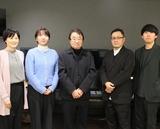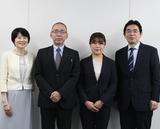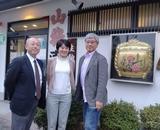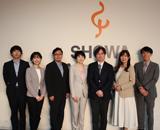August 2019
Innovative Owned Media Powered by the 3DEXPERIENCE Strategy
Be a Communicator, Not a Language Specialist
Ohsato: What other work do you do at your department, Ms. Kagami?
Kagami: We do a wide range of work and handle in-house translations and interpretations. When headquarters translate a project into multiple languages at once, we also review the translated documents. For all these operations, we ask Arc Communications for help.
Ohsato: Thank you for working with us. Can you go into some of the specifics?
Kagami: Our department often works to support marketing and sales, so in that sense, we're handling translations and interpretations that have a lot at stake. For example, translating product documents for our customers or interpreting sales presentations tie directly into the company's income. We're not just converting individual words into another language. In the limited time that we have, we need to be able to determine and convey what's most important for the company. People on this job need to be able to adapt to any situation and bring out the right resources at the right time.
Ohsato: You have a wealth of knowledge on your products and business, while also being fluent in French and English. I've always wanted to ask how you acquired those skills.
Kagami: I was always interested in languages and graduated university with a degree in French literature. But since English is necessary in business, I decided to study English after French. I'm a rare case (laughs). My first job involved car systems, so I learned about cars and IT there, and since then, I've always worked in technology-related fields.
Ohsato: I see, and that led to your current job.
Kagami: Yes. This may sound cliché, but I like helping people. I feel happiest when I'm able to be a bridge for someone who wants to convey something to another person. In terms of my work right now, I want to be the bridge between our customers in manufacturing and our individual feelings of dedication to provide the best support we can as a software vendor. That's what drives me right now.
Ohsato: A job in communication in the truest sense.
Kagami: Exactly. An interpreter I really admire once said to "always be a communicator." In other words, the fundamental significance of languages is not to create language specialists, but to create communication that conveys feelings and ideas. The important thing is to think about how to use the tool of languages to connect people and the feelings they want to convey.
The More Advanced the Subject, the More Thrilled Translators Are
Baba: How do you feel about Arc Communications' translations and interpretation services?
Kagami: I believe one of your company's strengths is choosing the best translators depending on the topic of a document. And we're very grateful that you can translate technical content.
Baba: Mr. Hosoe is in charge of making those sorts of arrangements as project manager.
Hosoe: When I receive the documents, I read through them first to choose the best translator, but since a lot of them are very technical, it's a surprisingly challenging task.
Kagami: I see, so the wonderful translations we receive are the results of such struggles. On our side, the coordinator for translations is Ms. Matsuda.
Matsuda: Sometimes, I'll say to Arc Communications that I'll send the documents by a certain date, but then there will be delays receiving the documents from headquarters. So I end up dumping them onto Mr. Hosoe late, and he still handles them all perfectly. I'm always amazed.
Hosoe: Translators actually enjoy this kind of demanding, difficult content. I think it tickles their curiosity. There aren't always translators in each specialized field, but skilled translators do their own research to understand what they're reading. They may require some extra time to do so, but they come back with an excellent understanding of the text, even if the topic is outside of their area of expertise.
Kagami: With technologies for machine translations improving rapidly, people may think that any translator can produce good translations. But I think that definitely isn't the case, since the quality of a translation fluctuates a lot depending on who the translator is. In that regard, we're very grateful that the stance at Arc Communications is to always have people handle translations from start to finish. By the way, Ms. Hirata is now in charge of interpretations.
Hirata: I've only really handled one project so far, but I know interpreters from Arc Communications review documents, memorize terms and do thorough research on our products in advance. They're very highly praised by the people on-site, and I feel that the quality of interpretations is very high overall.
Miyagi: Thank you very much. When we receive interpretation requests from Dassault Systèmes, we can always rest assured because we know you are knowledgeable about interpreting and translating. You understand that the documents we receive in advance are important, so when we press you for them, you always try to get them to us. Even when you can't, you tell us so. It helps us a lot.
Showing Customers What They Are Not Seeing
Ohsato: Are you working on anything new for the future?
Sato: Our fashion technology department, FashionLab, collaborated with the research team of Denmark's shoemaker, ECCO, to create a project called QUANT-U. Customers take 3D measurements of their feet in the store and even measure the way they walk using a treadmill. Then staff members print a custom midsole using the store's 3D printer. Our technologies are being used to instantly create these 3D forms of the soles based on the enormous amount of measured data.
Ohsato: I feel like this is going to create a new kind of business model.
Sato: Yes. If this sort of methodology is further developed, businesses may, in the future, be able to provide customers with customized shoes, clothes or furniture in the store. If that happens, stores will no longer need to have warehouses to keep stocks of different sizes and colors. They may not even need to create catalogs anymore. The rise of this new methodology may greatly change the customers' shopping experiences, and at the same time, it has the potential to also change all the technology and insight necessary to the industry.
Kagami: We believe our mission is not only to turn our customer's requests into reality, but also to show them what they are not seeing yet. Dassault Systèmes tells customers about the sort of technologies that will likely come out in the future and suggests ways they can be used.
Catching the Trends of the Time and Moving Forward Together
Ohsato: Are there any requests you would like to make to Arc Communications?
Kagami: People from translation and interpretation companies generally say that they translate and interpret by first understanding the product, but I think that's a very difficult thing to do. But Mr. Hosoe always signs up for the forums we hold every year and comes to listen. I'm always amazed and think it's incredible that he acts on his own to gain greater insight into what our company is doing. We'd like to ask you to continue upholding that sort of approach.
Ohsato: As part of our mission, we are dedicated to conveying both the feelings and intrinsic qualities of our customers.
Kagami: When we're hounded by our daily tasks, it becomes all too easy to neglect those aspects, which ultimately leads to lowering the quality of translations. We must pay close attention to that. Since our company's business develops very quickly, with a lot of M&A's going on, and we deal with the most advanced products of our time, we're very grateful that you are catching the trends with us and are standing ready to handle whatever topics we throw your way. I look forward to continue working with you in the future.
Ohsato: Thank you very much for your time today.
Feature Interview Index
















